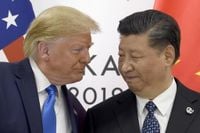The global automotive industry is facing a growing crisis as China’s export restrictions on rare earth materials continue to disrupt supply chains and threaten production worldwide. These materials, essential for everything from electric vehicles to household appliances, have become a focal point in the ongoing trade tensions between China and the United States, with ripple effects felt across Europe and beyond.
On June 3, 2025, Maros Sefcovic, the European Union’s trade commissioner, met with Chinese commerce minister Wang Wentao during the Organization for Economic Cooperation and Development conference in Paris to address the issue. Sefcovic emphasized the urgency, calling the situation a “priority” and warning of the “alarming situation in the European car industry.” He highlighted that rare earths and permanent magnets are “absolutely essential for industrial production,” affecting a broad range of sectors beyond automotive manufacturing.
China, which controls approximately 90% of the global processing of rare earths, imposed new export controls in April 2025 during a peak in its trade dispute with the United States. These controls cover seven types of rare earth minerals and several magnets critical for civilian and defense applications alike. Exporters now must apply for licenses for each shipment, providing detailed documentation about the intended end use. However, since the restrictions began, Chinese authorities have approved only about one-quarter of the hundreds of applications submitted, according to the European Association of Automotive Suppliers (CLEPA). The application process has been criticized as opaque and inconsistent, with some licenses denied over procedural issues or demands for sensitive information, including intellectual property.
German automaker Volkswagen reported limited export licenses for its suppliers, while customs data revealed that shipments of rare earth magnets to Germany halved from March to April 2025, coinciding with the introduction of the controls. Sefcovic and Wang compared their respective data during their meeting and found discrepancies, with plans to clarify and continue discussions soon. The EU prefers a more systematic approach, proposing a general annual application per company to reduce paperwork and industry stress.
Across the Atlantic, U.S. officials share growing frustration over the slow pace of export approvals. The Trump administration expected China to lift restrictions on rare earth exports as part of a 90-day trade truce reached in Geneva, but Beijing has yet to comply fully. Some Chinese suppliers have received approval to export to American automakers, though some shipments may be destined for operations outside the U.S. A source familiar with the matter noted that only a few Chinese officials are processing over a thousand applications, suggesting that expediting approvals is not a priority for China.
A U.S. rare earth trader revealed that his company has waited seven weeks for shipment approvals, with one application requiring a photo of the end user’s manufacturing facility—a request customers are reluctant to fulfill due to concerns about disclosing sensitive or defense-related information. “If the customers are associated with U.S. defense, if they tell the truth, they’re not gonna be approved,” the trader said. This has led manufacturers to scramble for stockpiles, driving prices up dramatically. Some materials are now selling for four to seven times their price two months ago, with yttrium—used in various high-tech applications—fetching more than ten times the previous price.
Even rare earth materials not on the restricted list face delays and increased scrutiny from Chinese customs, with some suppliers refusing to ship non-restricted materials amid heightened enforcement. Customs data shows shipments of rare earth magnets to the U.S. plunged 60% from March to April 2025.
China’s foreign ministry spokesperson Lin Jian defended the export controls on June 5, stating they are “in line with common international practices, non-discriminatory and not targeted at specific countries.” Despite this, the restrictions have sparked significant concern among global automakers and governments alike.
Reuters reported on March 3, 2025, that global automakers such as Toyota, Volkswagen, and Hyundai have voiced urgent warnings about the potential for factory shutdowns within weeks due to these supply disruptions. General Motors reportedly sent a confidential letter to the Trump administration in May highlighting the severity of the situation. The Alliance for Automotive Innovation underscored the critical role of rare earth minerals in components like automatic transmissions, alternators, motors, sensors, seatbelts, speakers, and lighting systems, warning that without these parts, U.S. car plants are at risk of halting production.
This development marks a new, more damaging phase in the U.S.-China trade war, with supply chain control becoming a key battleground. Governments in Japan, Europe, and elsewhere have requested urgent meetings with Beijing to address the issue. White House spokesperson Karoline Leavitt noted that President Trump is expected to discuss China’s rare earth export controls with President Xi Jinping in the week of June 2 to June 8, 2025.
Meanwhile, the rare earths market is seeing shifts beyond China’s borders. On June 5, 2025, shares of Australia’s Lynas Rare Earths surged to their highest level in over two years amid rising concerns about supply stability. As the world’s largest rare-earth producer outside China, Lynas is positioned to benefit from geopolitical tensions and surging demand for critical minerals, especially those tied to green technologies.
Market analyst Hebe Chen of Vantage Markets commented, “Lynas’ rally ... is a powerful reflection of the dual drivers at play today: escalating geopolitical tensions and surging demand for green technology.” Lynas’ stock jumped 11.8% to A$9.2, marking its biggest intraday gain since October 2023.
Despite rare earth elements being relatively common in the earth’s crust, China’s dominance lies in its mastery of the complex and environmentally challenging refining process. The United States operates only one rare-earth mine, but most of its output is shipped to China for processing, highlighting the strategic importance of non-Chinese producers like Lynas.
German automakers have echoed the urgency of the situation. CLEPA reported that several production lines have already shut down due to depleted supplies, and Mercedes-Benz disclosed plans to work with suppliers on building “buffers” such as stockpiles to mitigate potential supply threats.
The intersection of geopolitics, trade disputes, and supply chain vulnerabilities has thrust rare earth materials into the spotlight. Their critical role in modern technology—from electric vehicles and renewable energy systems to defense hardware—makes the current export restrictions a potent lever in international relations.
As negotiations between the European Union and China continue, and with upcoming discussions between U.S. and Chinese leaders, the world watches closely. The outcome will not only influence global manufacturing but also the broader dynamics of trade and diplomacy in a rapidly shifting geopolitical landscape.




